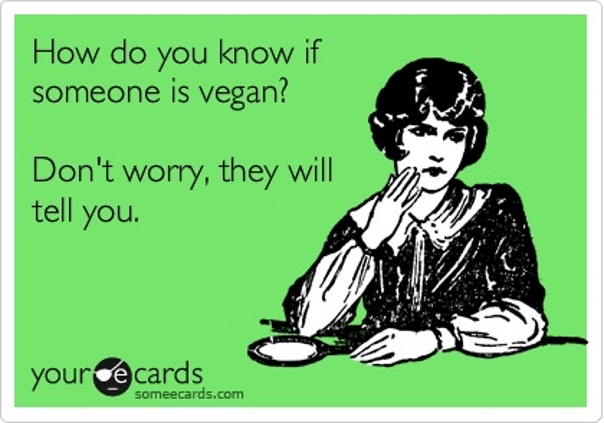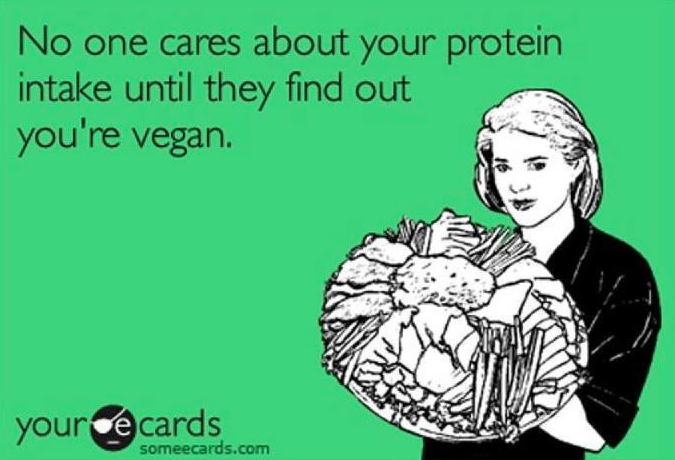I’m sure you’ve seen the one-line that’s the title of this post:

Although the above joke is about vegans, it’s a standard template used against lots of other groups (as we’ll see below).
An interesting connection to the vegan version of the joke is the countless times I’ve seen LGBT people accused of “flaunting” their sexuality, shoving it in people’s faces and even imposing it on others. This is often set off by the most indirect factors, like someone having a picture of their same-sex partner at their desk at work. And it’s not like the increasing public support for gay marriage (a commonly used but poor barometer for homophobia) have stopped this. Here’s just one Yahoo Answers thread with comments that are very revealing about that mindset. (As a warning, yes, reading that page is exactly like “reading the comments” on an average internet article…) So theres’s some connection in terms of people who are perceived to be shoving some fact into the face of others.
But first, let’s look at who people like to make fun of with the above joke. In Google, you can use an asterisk as a wildcard so when I searched for “how do you know * they’ll tell you”, I got all the variations. There were 369 million results and below is a summary of the first page of 100. I removed cases not relevant to the joke and 2 cases that I couldn’t parse. Square brackets have the number of occurrences.
How do you know someone…
- …is a vegan/vegetarian[22]
- …does Crossfit[11]
- …is a runner/runs a marathon[4]
- …went to Trinity/Oxbridge/Bozeman[4]
- …is a pilot[3]
- …is an atheist[2]
- …is an iPhone user[2]
- …is gay[1]
- …is an ex-smoker[1]
- …is a Linux/arch user[1]
- …is a jeep owner[1]
- …doesn’t have cable[1]
- …is a green voter[1]
- …drinks scotch[1]
- …plays Dwarf Fortress[1]
- …drives a hybrid[1]
- …is a Serb[1]
- …eats paleo[1]
- …is an American[1]
- …lives in Miami[1]
- …is gluten free[1]
- …is using free aim[1]
- …homebrews[1]
There was an interesting gender difference. Both “he’ll tell you” and “she’ll tell you” got very few results (less than 20). The male variation had results somewhat similar to the above (the most popular being pilot and atheist), but the female variation wasn’t related to the joke at all. Most cases were about “her [your presumed girlfriend] telling you” about some issue in your relationship.
The common thread is that these are groups/subcultures seen to be overly in love with their particular identity and hence broadcasting it even when it’s not relevant. There’s also a perceived holier-than-thou attitude implied in some of these. Telling someone “I just ran a marathon” also implies something like “and you should run one too so you can be as good as me” or even “what’s your excuse?” (which is often used shittily to shame people).
The next question is the accuracy of the above list. There are definitely members of each of the above groups who are arrogant and holier-than-thou about it. But some of the cases are just about our perception of what a person’s “default” identity is/should be, and the extent to which extra information changes this perception. Someone who’s LGBT is then the classic example. If our “default” for a person is heterosexual (which it could well be even for a lot of LGBT people because of implicit bias), then any contradictory information would shatter this perception. It is probably this shattering that people notice when they accuse someone of, say, “flaunting” being gay due to a picture of their partner. The more invested you are in the default, the harder you’ll take it being shattered.
The same applies to many religious minorities. If you belong to one of these, your mere existence is often an affront to the stereotypes, assumptions and expectations people will form. This is why learning about Islam in a USA religion class is often considered to be an attempt to convert “our children”. This is why a Hindu cleric giving an invocation at the US Senate causes people to lose their shit. Or why this conversation happens commonly-enough to be a trope:
Person 1: What church do you go to?
Person 2: Actually I don’t; I’m an atheist.
Person 1: Why do you have to be so in-your-face about it? Stop trying to convert me!
There’s an extra dimension to any identity which stems from a belief, for example being a vegan, a feminist, an atheist, a Jain etc. As Greta Christina aptly pointed out years ago, the statement “I’m an atheist” does carry an implied “and therefore if you’re not, I think you’re wrong,” which is not the case for a statement like “I’m LGBT”. So it’s natural that identifying yourself with one of these beliefs will make many people defensive even if you’re not actually being an asshole about it.

If you’re not one of these classes mentioned so far (atheist, vegan, feminist, Muslim, Hindu or Jain), you can still perform the experiment on yourself. If you hold any minority belief, imagine it being brought up in conversation and the person you told later joking with their friends “How do you know someone’s an X? They’ll tell you.”
This shows the point of that joke for some of these cases. It literally is about putting people in a minority position back in their place. If they didn’t have a minority position them “telling you” about some aspect of themselves would not be considered jokeworthy. A classic case of the punching down joke. It’s interesting that I didn’t find any cases of “how do you know someone’s a Christian?”.
Finally, the joke has a telling corollary. How do you know someone’s a vegan/Muslim/atheist/feminist etc? They’ll tell you. But how do you know someone’s (say) heterosexual? They don’t need to tell you. You’ll probably assume. A white man definitely doesn’t need to tell you that they are one, even in an online interaction where you can’t see them. That joke is then reserved for those who need to say something. Those of us who count as the default are still indirectly telling people about it — hundreds of times a day. But if we are so in line with norms that we don’t need to actually speak, we aren’t at risk of being the joke’s target.





0 Comments